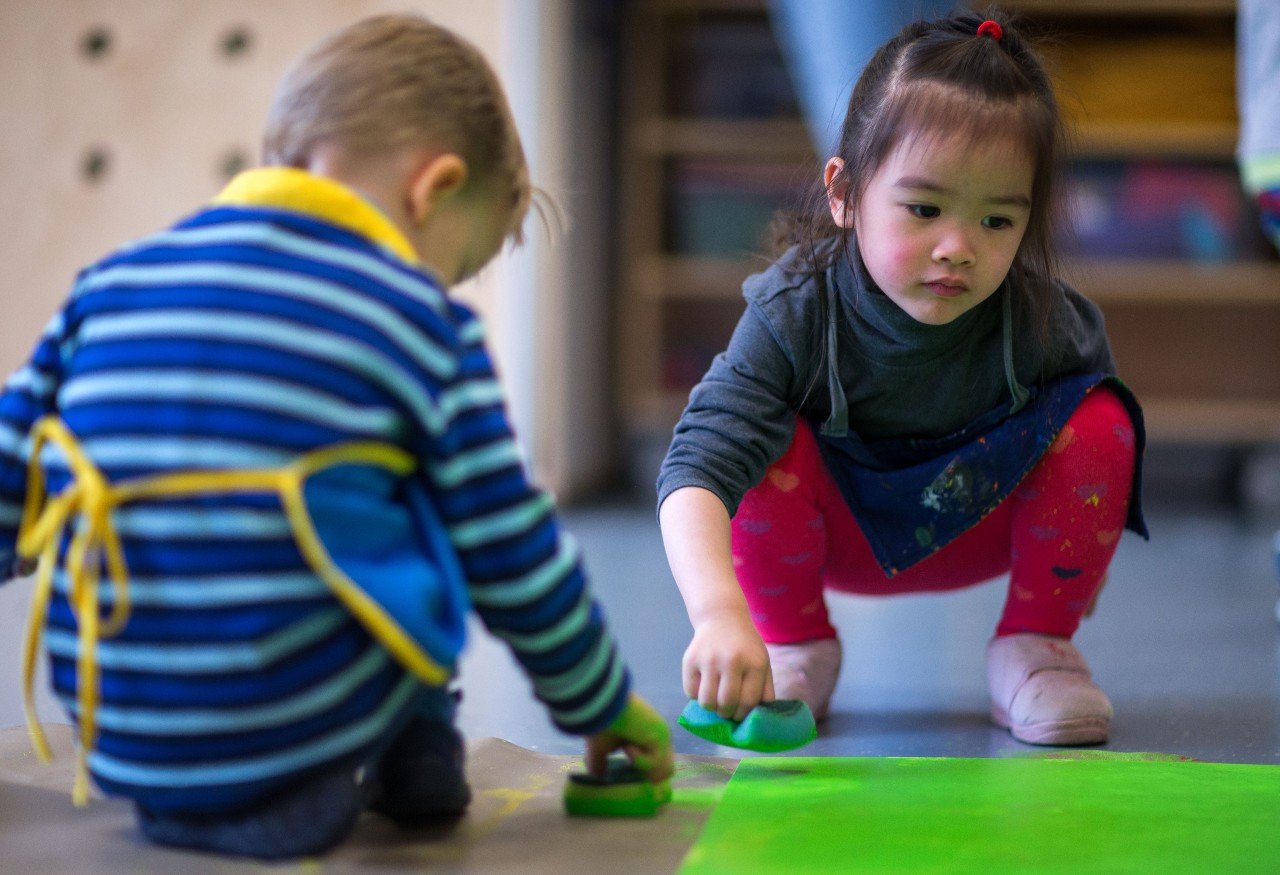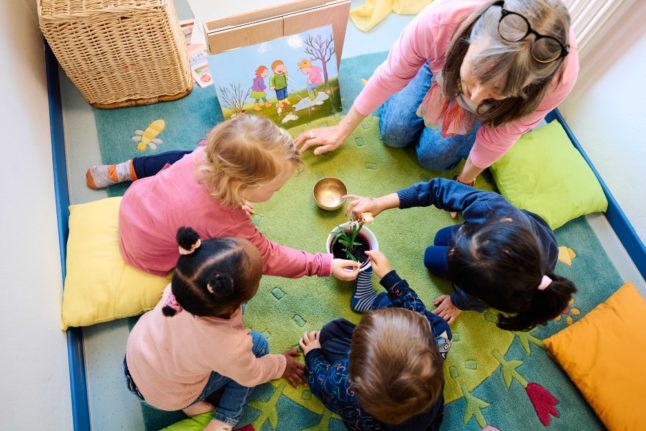That’s according to a recent German Economic Institute (IW) study which found daycare is “particularly expensive for children under the age of three”.
The costs of care depend on several factors including: income, locality, age, number of children, and type of care facility.
Germany has guaranteed young children over the age of one the legal right to a place in a daycare centre since 2013. The country offers different types of childcare options from Kinderkrippen (nurseries) to Kindergärten (pre-schools), but they all fall under the umbrella term of Kita, which is short for Kindertagesstätte (child day care centre).
READ ALSO: It’s not impossible: How I found a good Kita in Germany
Dr. Wido Geis-Thöne, IW’s senior economist for family policy, said different approaches to childcare across the country can make it a challenge to pinpoint costs.
“Attendance at daycare centres would ideally be regulated nationwide and free of charge for all children in the last few years before starting school,” he said. “However, due to the current budget situation of the states and municipalities, this cannot be implemented everywhere, as the freedom from costs must not come at the expense of the quality of care.”
Costs vary wildly from nearly free spots in Berlin – save for a €23 a month fee – to €296 per month for one-year-olds in Koblenz.
And the legal right to daycare cannot always be fulfilled by current offerings. According to an analysis from Bertelsmann Foundation, there is a shortage of nearly 430,000 daycare spots in Germany.
How much should I expect to pay?
The city of Bergisch Gladbach in the state of North Rhine-Westphalia has the highest cost of full-time care in Germany. Parents can expect to pay up to €1,200 per month for a child under two. The same childcare is nearly free in Berlin and Kiel.
These monthly costs do not include the costs of meals and other services like language lessons and special activities.
READ ALSO: What foreign parents in Germany need to know about Sprach-Kitas

Average costs of childcare across Germany
The German Economic Institute analyzed data from 82 large cities across Germany.
Bavaria
The cost of childcare in Bavaria varies widely from city to city. Costs for childcare in Munich are expected to rise after a court found Munich’s current childcare funding system was unlawful. At the start of the next daycare year in September, Parents may have to shell out more than €1,000 to secure a spot for their child at a private provider.
Baden-Württemberg
Childcare costs in Baden-Württemberg vary depending on where families live. State law only requires fees to consider the economic situation and number of children. But some cities have taken this a step further. Heilbronn offers free daycare for all children three and up.
Berlin
Berlin has offered free nurseries and day care centres since 2018. Parents are expected to pay €23 for meals. And some Kitas offer additional activities like sports and language lessons at an extra cost.
READ ALSO: Why are Berlin Kitas in a state of crisis?
Bremen
Parents in the northern city-state can take advantage of daycare free of charge for children ages three and over. This excludes the cost of meals which parents are expected to contribute toward. Families receiving social benefits and BremenPass holders can get their childcare for free, regardless of the child’s age.
Hamburg
Hamburg offers five hours of childcare for free, but full time care costs must be covered by parents. The cost of care is the same regardless of the child’s age group.
Hesse
Daycare for children three and up is also free in Hesse, but this only covers a six hour day. Parents must cover full time care. For younger children, daycare fees vary.
Lower Saxony
Like Bremen, parents in Lower Saxony can enjoy free daycare for children three or older. The benefit is limited to an eight-hour day.
Mecklenburg Western-Pomerania
Mecklenburg Western-Pomerania followed the lead of Berlin in providing free nurseries and day care centres. Parents can take advantage of up to 10 hours of free childcare throughout the week before contributing toward costs.
North-Rhine Westphalia (NRW)
The last two years of daycare are free for parents of kids in North-Rhine Westphalia. The costs of care for younger children are scaled according to parents’ income.
Rhineland-Palatinate
Rhineland-Palatinate offers free childcare beginning with two-year-olds. Childcare costs vary depending on the district for younger children.
Saarland
Parents in Saarland will be able to enjoy free childcare beginning 2027. But for now daycare fees will be gradually capped. This is a change from the original rule which called for parental contributions to not exceed 25 percent of personnel costs.
Saxony-Anhalt
Saxony-Anhalt does not stipulate limits on parental contributions for daycare. Instead, fees are decided by the cities and municipalities in coordination with childcare providers.
Saxony
In Saxony, parental contribution also varies from city to city. But the fees should not exceed 15 to 23 percent of the average municipal costs for a nursery place and 15 to 30 percent of the costs for a preschool place. In the state capital, €207 are charged for all-day care in a Krippe and €150.48 in a Kindergarten.
Schleswig-Holstein
There is a state cap on daycare fees in Germany’s northernmost state to reduce the financial burden on parents. Parents can expect to shell out up to €232 per month for children under three. The costs decrease to €226.40 per month for parents of children three and over.
Thuringia
Parents can count on free childcare for the last two years of kindergarten. Important to note that this applies exactly 24 months before regular school entry, not the age of the child. Otherwise parental contributions vary depending on the scope of care, number of children and parents’ income.



 Please whitelist us to continue reading.
Please whitelist us to continue reading.
Member comments